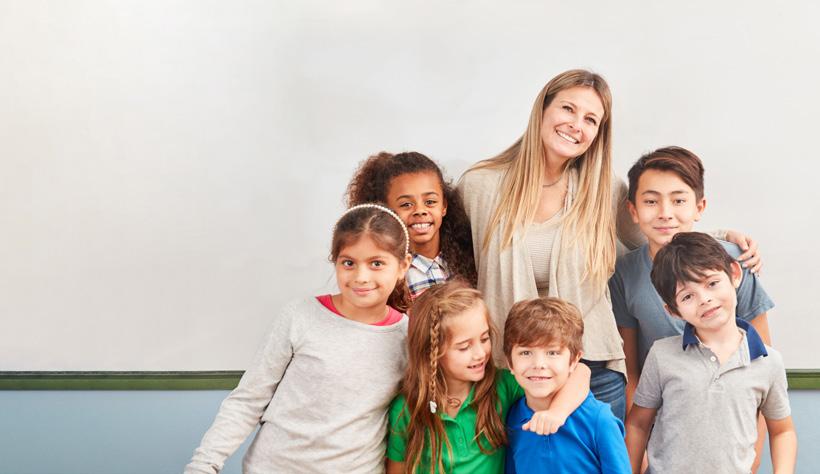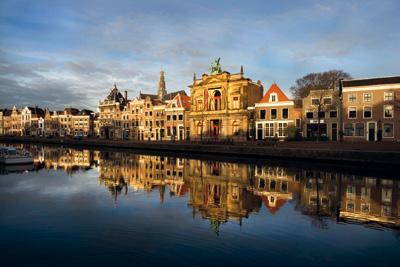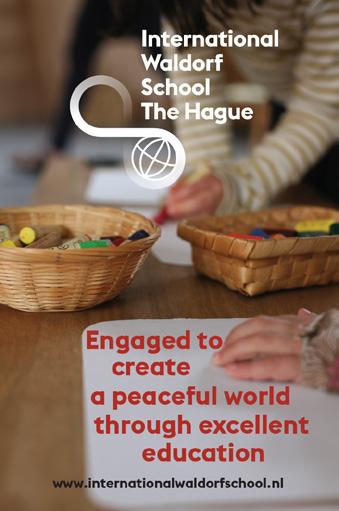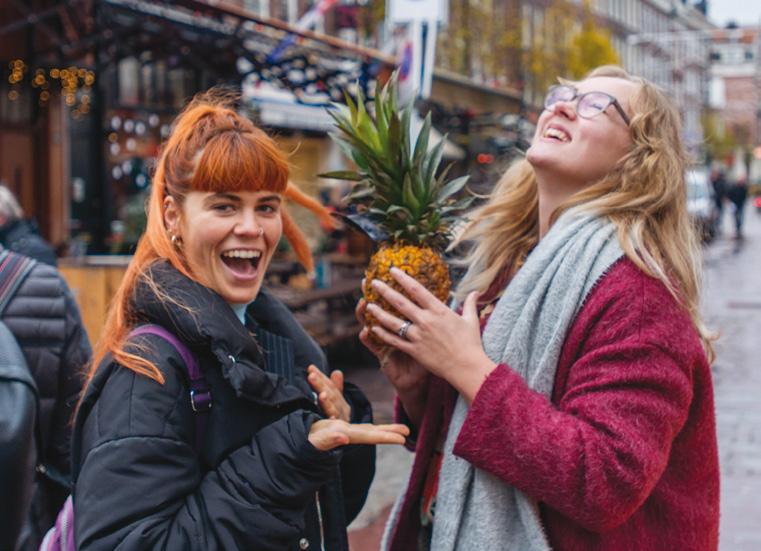
18 minute read
EDUCATION Primary, secondary and higher education; International school, Learning Dutch
EDUCATION THE NETHERLANDS IS COMMITTED TO CHOICE IN EDUCATION.
The OECD international rankings for school systems puts the Netherlands as one of the highest in performance. The Dutch rank highly in many fields of education. Over 48% of Dutch 25-34 year hold a degree in higher education, which is significantly higher than the OECD average of 44%. The Netherlands is among the world’s top countries for equity in education opportunities. Children of all nationalities are (under a learning obligation) at 5 years old for 12 years of full-time education, and one or two years part-time (until achieving a diploma). Less than 1% of the 1.5 million primary school children attends a private (fee-paying) Dutch school.
Advertisement
CHOOSING A SCHOOL
younger children might get a greater sense of belonging by attending a local school if you plan to stay for a while.
APPLYING FOR A SCHOOL
• International education is available at • Every city/town has its own school both state-funded and private schools application policy. Inquire as soon as throughout the country, and nineteen you can with the municipality and/or primary schools have implemented school of your preference how it works bilingual education. in your area. • More than 1.150 primary schools in the • In most cities the schools work with a
Netherlands offer English classes from waiting list and you’ll need to sign up group 1 (age 4), and about another as soon as possible. Some cities, like further 119 teach German, French or Amsterdam, Haarlem and The Hague,
Spanish. From group 7 (age 10) all have a different policy; a school lottery. schools are obliged to teach English as • Openbare schools (which are run by a a subject. foundation that has originally been set • Schools following particular religious up by the municipality) are technically or pedagogic principles have had not allowed to refuse admission, equal state funding as public schools unless full. since 1917. • On the schools’ websites they announce when you can visit the school (open LOCAL OR INTERNATIONAL? day/info session). Most schools don’t • Your finances, location, the age of your • On www.scholenopdekaart.nl (in Dutch) children, and how long you are likely to you can find more information about stay in the Netherlands are factors to the schools, as well as their results. consider when selecting a school. Here you can also find a link to the • Many companies reimburse international school inspection reports. The visual school fees as part of your relocation representation of green (good), orange package, and reimbursement could be (weak), and red (very weak) will give exempt from income tax. some idea of performance. Note that • TIP: While teenagers might appreciate this applies to state-funded schools and the educational and social continuity Dutch international schools only. There provided by an international school, is no official ranking of schools. give private appointments.
COSTS

• Primary and secondary state-funded education is free, parents are asked to contribute a voluntary amount that varies from school to school (usually below 100 euros per year). • Additional payments can include school trips, lunchtime supervision (tussenschoolse opvang) and after-school care (naschoolse opvang/BSO), (which the school usually subcontracts to an external day care organisation).
EDUCATION POLICY
• The Ministry of Education, Culture and Science sets quality standards, attainment targets and social objectives. • Individual schools “fill in the details” of the curriculum and budget allocation. • Education policy includes bilingual opportunities, connecting education with the job market, global citizenship, and maintaining the quality of schools.
SCHOOL HOLIDAYS
• Major holidays for Dutch schools are set nationally, but with staggered start/finish times between three regions.
The summer vacation lasts for six weeks, and after every 6-7 weeks of school, the students have 1-2 weeks off. • Private international school holidays can be different. For school holidays per region, look at www.schoolvakanties-nederland.nl/ (in Dutch).
TYPES OF SCHOOL
State-run (openbare) schools
• Openbare schools (non-denominational) provide secular education, but sometimes teach according to specific philosophic or pedagogic principles like Montessori,
Dalton, Waldorf/Steiner, etc. • Openbare schools are governed by the municipal council or a public legal entity or independent foundation originally set up by the council.
Special (bijzondere) schools
• Most special (bijzondere) schools are denominational (Catholic, Protestant, Islamic, Hindu, Jewish, etc.), or follow specific philosophic principles. • Special (bijzondere) schools are governed by their own school board, which often consists of parents or the foundation that set them up. • Financially, they have the same status as openbare schools and are basically free (usually their parent contribution is slightly higher compared to the openbare schools).
International schools
• International schools offer education for global students of any nationality. • Dutch International Primary Schools (DIPS) and Dutch
International Secondary Schools (DISS) also have international education at reasonable fees thanks to
government subsidies – made for non-Dutch families living temporarily in the Netherlands and Dutch families returning from, or preparing for, an overseas assignment. • These schools offer the International Primary Curriculum (4 to 11 years), the IGCSE (11 to 16 years), or the
International Baccalaureate programmes at primary (4 to 11 years) and middle years’ level (11 to 16 years). All DISS teach the IB-Diploma programme (16 to 19 years). • A new curriculum, IBCP, offers a career-related alternative to the IB-DP in the final years (www.ibo.org). • Private International schools: These schools teach an international curriculum, or a specific country’s national curriculum: American, British, French, German, Japanese,
Indonesian, etc. Their fees are much higher compared to the subsidised international schools.
SPECIAL NEEDS SCHOOLS
• The national “Appropriate Education” (Passend Onderwijs) policy is designed to enable as many children with minor learning difficulties as possible to be educated in mainstream schools. • Additionally, there are dedicated schools for children who have more severe or complicated learning difficulties. • Lighthouse Special Education in The Hague caters to international special needs children providing extensive assistance in English. Entry is by referral.

PASSIONATE ABOUT LEARNING


The International School Haarlem offers a positive learning environment where students (4-18 years) are encouraged to realise their full potential. Through internationally respected and recognised programmes we involve our students in meaningful learning. International School Haarlem info@internationalschoolhaarlem.nl www.internationalschoolhaarlem.nl

We believe in developing minds, character and communities.

www.isa.nl | admissions@isa.nl ISA is a global leader in international education, serving almost 1400 students from over 60 countries.
Deeply embedded in our culture is a passion for inspiring students to reflect on their own world-view and a commitment to helping others.
DUTCH PRIMARY EDUCATION (PRIMAIR ONDERWIJS/PO OR BASISONDERWIJS)
• Children usually start school the day after their 4th birthday. • There are eight years of primary schooling: “Group 1” upon entry, moving up a group every year. • Based on various factors including the pupil’s test scores from past years, intelligence, attitude towards learning, eagerness to learn, interests, and motivation, the group 8 teacher assesses what level of secondary school education would fit each pupil best. • Later in the year, the pupils take the “End Test for Primary
Education”, a standardised aptitude test consisting of questions testing Dutch language and comprehension skills, mathematics, study skills, and (optionally) world orientation; a combination of history, geography, biology and world religions. • All primary schools are obliged to take part in one the five available end tests. • The assessment of the teacher is the decisive factor for referral to secondary education.
DUTCH SECONDARY EDUCATION (VOORTGEZET ONDERWIJS, VO)
• From 12 years of age, pupils choose between vocational or pre-university programs based on their abilities, interests, and the teacher’s recommendation in group 8. • In the first years all pupils study the same subjects (to different academic levels), known as the basisvorming, followed by a second stage (tweede fase) in which students choose a specialist profile.
Dutch for Expats: Learn Dutch fast in Amsterdam!
o o o o o o o o o o Group courses on all levels Daytime Courses Evening Courses Weekend Courses Preparation on the State Examination NT2 Preparation on the Civic Integration (Inburgering) Exam Private Lessons Lessons per Skype Corporate Lessons (In-Company) Monthly free Language Pub!
www.katakura-wblc.nl

Please take a look at our website for detailed information. Or contact us by email: katakurawblc@gmail.com
Building upon each child’s unique academic, emotional, physical and social talents www.fl orenciusinternationalschool.nl

› Small groups (1 teacher per 8 pupils max) › Individual attention › Personal Development Plan › 4 Qs; holistic approach › Immersed in Dutch community › Leafy surroundings near Amsterdam › Children aged 4-12 years

De Savornin Lohmanlaan 2 - Amstelveen
• Most secondary schools combine multiple levels in the first year (brugklas). • VMBO: A four-year prep school for vocational secondary education. Those who achieve the highest level (theoretische leerweg) can enter HAVO studies in the 4th year. They must continue studying until age 18, or until they obtain a basic qualification (minimum MBO level 2). • MBO: Secondary vocational education. MBO programmes vary from one to four years. If a student has successfully completed the Dutch VMBO, or the international middle school programmes IGCSE, or IB-MYP, but is not admitted to the IB-Diploma Programme, the MBO can prepare pupils for work or University of Applied Sciences (HBO) if level 4 is achieved. A number of English-language programmes are offered. • HAVO (five years): Senior general secondary education.
Provides entrance to University of Applied Sciences (Hogeschool/HBO), or 5VWO. • VWO (six years): Pre-university education. Prepares students for academic studies at a research university (WO). VWO schools can be athenaeum, or gymnasium, the main difference being that Ancient
Greek, Latin and Classical Studies are core subjects in gymnasium programmes.
BILINGUAL EDUCATION (TWEETALIG ONDERWIJS TTO)
• There are over 130 schools with a TTO bilingual stream, most of them being offered at VWO level. Only students that master the Dutch language at an appropriate level will be admitted. More information you can find on the Nuffic website. • English is a compulsory subject at all secondary schools.
VMBO pupils study one modern language, and HAVO/
VWO pupils at least two. Other core areas include Dutch, mathematics, history, humanities, sports, arts and sciences. • Like primary schools, some secondary schools are based on a religion, or an educational philosophy.
HIGHER EDUCATION
• Third-level education is offered at a vocational level (HBO, a “university of applied sciences” or hogeschool) and at an academic level (WO, at a universiteit). • Bachelor’s and Master’s degrees are available at both HBO and WO institutions, but only universities offer PhD programs. Nuffic (Netherlands organisation for international cooperation in higher education; www.nuffic.nl) includes extensive information about the
Dutch higher education system. • There is a small, third branch of higher education offering international education (IE), comprising advanced courses suited to international students. • Institutions are either government-funded, or governmentapproved.
HBO
• Nearly half a million students are enrolled at “universities of applied sciences” or hogescholen/HBO that provide practical-based four-year programs. • Here, students prepare for particular professions in one of seven sectors: agriculture & food, natural sciences & technology, economics, business administration & law, healthcare, fine & performing arts, education/teacher training and social studies. • For more information visit www.hbo-raad.nl.

l . n h a s
More An than a School. Experience. SURVIVAL GUIDE FOR INTERNATIONALS 2021 • THE NETHERLANDS • WWW.EXPATFAIR.NL
WO (UNIVERSITY - UNIVERSITEIT)
• There are over a dozen government-funded research universities offering international degrees and short courses via intensive, academic studies (visit www.studyin.nl). • University programmes consist of a Bachelor’s or undergraduate phase lasting three years. • A master’s or graduate degree takes between one to two years. • More than 2,100 programmes are taught entirely in English, see https://www.studyinholland.nl/dutch-education/findstudy-programmes. • Many Dutch universities have partner institutions in other countries, so students can study part of their course abroad.
COSTS
• Fees depend on your nationality and age. • The fee for EU/EEA nationals is set by the Dutch government (just over €2,000 per annum). Most students get a 50% discount on the fees for their first year of study.
Students of the teacher training school also get 50% discount on the 2nd year of their study. • Tuition fee loans are available. • The fees at private institutions can be substantially higher.
HOW TO APPLY
• Over 90,000 international students study in the
Netherlands. This is about 12% of the total student population. Information on fees, qualifications and study programmes is widely available in English.
Celebrating over 35 years in Leiden!
25-50% Scholarships Student Housing Classes in English
Our students enjoy:
Advanced transfer credits: AP, IB and GCE programs Higher Learning Commission Accreditation (USA) ACBSP Accredited Business Programs Evening Courses for Graduates
Email: admissions@webster.nl for info!


• Contact the institutions – they will specify what education qualifications are required for admission. A quota system is in place for oversubscribed courses; here students are selected based on the criteria set by the university. • You can apply online for third-level courses that are subsidised by the Dutch Ministry of Education through www.studielink.nl.
QUALIFICATION ACCREDITATION
• Diplomas and certificates awarded abroad need to be accredited by the Dutch authorities. (Often the school where you have applied takes care of this). The IDW
Internationale Diplomawaardering (www.idw.nl) also offers this service for a fee. • Non-native English speakers are required to pass an English language test at a specified level, most commonly the TOEFL, IELTS or Cambridge Test.
EDUCATION LINKS
Information on the Dutch education system • Ministry of Education, Culture and Science • www.government.nl/ocw Independent education consultant for international families in the Netherlands (both Dutch and international schools) • New2nl, Annebet van Mameren, www.new2nl.com • Helpdesk for International Education in the Netherlands • Educaide, Willemijn van Oppen Stuyt, www.educaide.nl • Stichting Internationaal Onderwijs, Foundation for
International Education in the Netherlands • www.sio.nl • Expat Special Educational Needs Group in The
Netherlands • www.eseng.nl • Dutch immersion/newcomer classes (for non-Dutch speaking children aged 6+) • www.lowan.nl • Primary schools which teach foreign languages from an early age (VVTO schools): www.earlybirdie.nl and www. nuffic.nl/onderwerpen/vroeg-vreemdetalenonderwijs-vvto • Bilingual pilot schools at primary level (TPO): www.nuffic. nl/onderwerpen/tweetalig-primair-onderwijs (17 in total in the whole country) • Bilingual schools at secondary level (TTO): www.ikkiestto.nl Higher education in the Netherlands www.studyinholland.nl • www.nuffic.nl/en Information on studying and funding www.duo.nl/particulier/international-visitor/index.jsp Portals for vocational training www.s-bb.nl/en • www.mboraad.nl/english Masters / PhDs www.mastersportal.eu • www.phdportal.eu Online applications www.studielink.nl Non-Dutch diploma evaluation www.idw.nl
LEARNING DUTCH
• Learning Dutch is a crucial step to integration in the
Netherlands and part of the immigration and integration (inburgering) procedure. • Europeans are not obliged to follow the inburgering procedure. • There is a wide choice of commercial language courses on offer to suit individual needs and budgets, with courses ranging from “Dutch for Au Pairs” to more intensive NT2 (Nederlands als Tweede Taal) classes. • Ask about the average class sizes. The smaller the class size (generally), the higher the fee. • Universities often provide beginner Dutch classes for nonstudents, although, as you would expect, a certain level of academic ability is required to keep up. • Homework is an essential part of the learning progress. • Some organisations fund language lessons as part of relocation, which might also include lessons for partners.
TIPS FOR LEARNING DUTCH
• Read with attention: Start with Dutch newspaper headlines and try to figure out what they mean. Later on, read articles and check out the verbs in the article. What tense is being used? What is the infinitive? Is it a regular or irregular verb? • Listen with attention: Watch TV or movies with Dutch subtitles. If you watch TV, you could use Teletekst 888 or
NPO Start for Dutch subtitles. • Learn new words: Write new words on a post-its and place them strategically around your space. Note if nouns are
“het” or “de” words. • Practice whenever you can: In emails, WhatsApp or spoken conversations use the Dutch you know, however little. If you have a Dutch partner, agree that you speak in Dutch only at least 10 minutes a day. Or that your partner speaks
Dutch and you answer in your mother tongue. • Use the internet: There are plenty of useful and free sites you can use to help you progress. For instance: www.taalklas.nl, www.dutchgrammar.com or www.schooltv.nl/beeldbank. https://jeugdjournaal.nl (children’s news) is also a good resource for the Dutch news, explained in easier language.



INTERNATIONAL SCHOOLS AMITY INTERNATIONAL SCHOOL AMSTERDAM Amsterdamseweg 204, 1182 HL Amstelveen • +31 (0)20 345 44 81 • enquiries@amity.amsterdam • www.amityschool.nl • @AmitySchoolNL AMSTELLAND INTERNATIONAL SCHOOL Asserring 93, 1187 SM Amstelveen • +31 (0)20 820 9091 • www.amstelland-international-school.nl AMSTERDAM INTERNATIONAL COMMUNITY SCHOOL Main Campus: Prinses Irenestraat 59, 1077 WV Amsterdam • +31 (0)20 577 1240 South East Campus: Darlingstraat 2, 1102 MX Amsterdam • +31 (0)20 723 5280 Primary School AICS Satellite: Arent Janszoon Ernststraat 130, 1082 LP Amsterdam • +31 (0)20 723 4830 infosatellite@aics.espritscholen.nl • www.aics.espritscholen.nl HAAGSCHE SCHOOLVEREENIGING We are one school with four locations, a Pre-School and a Special Education school. International Education - NSL Nassaulaan 26, 2514 JT The Hague • +31 70 318 4950 International Education - KSS Koningin Sophiestraat 24A, 2595 TG The Hague • +31 70 324 3453 International Education - VHS van Heutszstraat 12, 2593 PJ The Hague • +31 70 205 1141 International Special Education - Lighthouse van Heutszstraat 12, 2593 PJ The Hague • +31 70 205 1141 International Pre-School Education – Three Little Ships van Heutszstraat 12, 2593 PJ The Hague • +31 70 205 1141 International Education - VNS van Nijenrodestraat 16, 2597 RM The Hague • +31 70 328 1441 • ldean@hsvdenhaag.nl • www.hsvdenhaag.nl HAARLEMMERMEER LYCEUM Baron de Coubertinlaan 2, 2134 CH Haarlem • +31 (0)23 563 1644 • info@haarlemmermeerlyceum.nl • www.haarlemmermeerlyceum.nl • @haarlemmermeerlyceumtto • @haarlemmermeerlyceum INTERNATIONAL SCHOOL EERDE (K-12; ALSO BOARDING) Kasteellaan 1, 7731 PJ Ommen • +31 (0)529 451 452 • info@eerde.nl • www.eerde.nl • @ISEerde INTERNATIONAL SCHOOL HAARLEM Primary dept. : Schreveliusstraat 27, 2014 XP Haarlem Primary Department- Upper primary: Oorkondelaan 65, 2033 MN Haarlem Secondary Department: Oorkondelaan 65, 2033 MN Haarlem +31 (0)23 220 0001 • info@internationalschoolhaarlem.nl • @internationalschoolhaarlem INTERNATIONAL SCHOOL HILVERSUM ALBERDINGK THIJM (Primary & Secondary school) • Emmastraat 56, 1213 AL Hilversum • +31 (0)35 672 9931 • www.ishilversum.nl • @ishilversum INTERNATIONAL SCHOOL UTRECHT Van Bijnkershoeklaan 8, 3527 XL Utrecht • 0031 (0)30 870 0400 • info@isutrecht.nl • www.isutrecht.nl • Instagram @isutrecht • @isutrecht • @isutrecht • International School Utrecht INTERNATIONAL WALDORF SCHOOL THE HAGUE (IWSTH) 2e Messtraat 31, 2586 XA Den Haag • +31 (0)70 7830030 • info@iwsth.org • www.internationalwaldorfschool.nl • @IWSTH • Instagram @international_ waldorf_school • @international-waldorf-school-the-hague OPTIMIST INTERNATIONAL SCHOOL Waddenweg 87, 2134 XL Hoofddorp • +31 (0)23 3035924 • info@optimist-international-school.nl • w.optimist-international-school.nl • @optimist.international.school • Instagram @optimist_international_school • @Optimist International School SUPREME COLLEGE NEDERLAND Koning Willemstraat 1, 1901 CA Castricum • +31 (0)251 652571 • info@supremecollege.nl • www.supremecollege.nl • @supremecollegenederland THE BRITISH SCHOOL OF AMSTERDAM (K-12) Early Years & School Office: Anthonie van Dijckstraat 1, 1077 ME Amsterdam • +31 (0)20 679 7840 • Infant School: Jan van Eijckstraat 21, 1077 LG Amsterdam • +31 (0)20 679 3060 • Junior & Senior School: Fred. Roeskestraat 94a, 1076 ED Amsterdam • +31 (0)20 679 0183 • info@britams.nl • www.britams.nl • @BritishSchoolofAmsterdam WEBSTER LEIDEN CAMPUS Boommarkt 1, 2311 EA, Leiden • +31(0) 71 5168000 • admissions@webster.nl • www.webster.nl • @WULeiden • Instagram @websterleiden • @webster-university---leiden LANGUAGE SCHOOLS ALLIANCE FRANÇAISE AMSTERDAM Oosterdokskade 143, 1011 DL Amsterdam • +31 20 523 07 42 • comm@afamsterdam.nl • www.afamsterdam.nl/en/ • @Alliance Française Amsterdam • Instagram @alliancefrancaiseamsterdam • @Alliance Française Amsterdam DIRECT DUTCH INSTITUTE Laan van Nieuw Oost-Indië 275, 2593 BS Den Haag • +31 (0)70 365 4677 • info@directdutch.com • www.directdutch.com DUTCH COURSES AMSTERDAM KATAKURA WBLC Havikshorst 30, 1083 TT Amsterdam • Egelantiersstraat 126, 1015 PR Amsterdam • +31 (0)6 21530814 • katakurawblc@gmail.com • www.katakura-wblc.nl • @DutchCoursesKatakura DUTCH COURSES AMSTERDAM Postjesweg 57, 1057 DW Amsterdam • +31 (0)6 54992219 • www.dutchcoursesamsterdam.nl • @DutchCoursesAmsterdam DUTCH FIRST Niasstraat 1, 3531 WR Utrecht • +31 (0)30 29 19 884 • info@dutchfirst.nl • www.dutchfirst.nl • @dutchfirst FLORENCIUS INTERNATIONAL SCHOOL De Savornin Lohmanlaan 2, 1181 XM Amstelveen • +31 (0)20 640 81 18 • info@florencius.nl • www.florenciusinternationalschool.nl • @florenciusinternationalschool • Instagram @florenciusinternationalschool • @Florencius B.V. FLOWENTLY PRIVATE AND IN-COMPANY DUTCH COURSES, LIVE AND ONLINE LESSONS Azartplein 79, 1019 PB Amsterdam • +31 (0)6 4133 9323 • info@flowently.com • www.flowently.com • @flowently HELPDESK STATE EXAMS DUTCH AS A SECOND LANGUAGE Valckenierstraat 65, 1018 XE Amsterdam • +31 (0)20 525 38 44 • marianne.vanderlinden@itta.uva.nl • www.staatsexamensnt2.nl LANGUAGE INSTITUTE REGINA COELI B.V. Martinilaan 12, 5262 BR Vught • +31 (0)73 684 8790 • hello@reginacoeli.nl • www.reginacoeli.com • @ReginaCoeliNL NEDLES Derde Oosterparkstraat 271, 1092 EA Amsterdam • +31 (0)20 846 0011 • info@nedles.nl • www.nedles.com • @nedlesnl • Instagram @nedles_learndutch • @NedLes SKYPELANGUAGESCHOOL.NET Rainstrasse 79, 8143 Stallikon, Switzerland • +31 (0)6 554 70051 • info@skypelanguageschool.net • www.skypelanguageschool.net • @skypelanguageschool.net • Instagram @skype_languageschool • @skype-language-school TAALHUIS AMSTERDAM Sint Nicolaasstraat 59, 1012 NJ Amsterdam • Muiderstraat 24, 1011 RC Amsterdam • +31 (0)6 14 303 131 • info@taalhuisamsterdam.nl • www.taalhuisamsterdam.nl • @taalhuisamsterdam • Instagram @taalhuis TAALTHUIS +31 (0)23 3050 305 • info@taalthuis.nl • www.taalthuis.nl • @taalthuis UvA TALEN LANGUAGE CENTRE Roetersstraat 25, 1018 WB Amsterdam • +31 20 525 4637 • trainers@uvatalen.nl • www.uvatalen.nl • www.thelanguageacademy.nl • @uvatalen @thelanguageacademyNL RIJSCHOLEN RIJSCHOOL DEKKER Hertogstraat 38, 5611 PB Eindhoven • +31 (0)40 444 44 44 • info@rijschooldekker.nl • www.rijschooldekker.nl • @rijschooldekker • Instagram @rijschooldekkereindhoven







